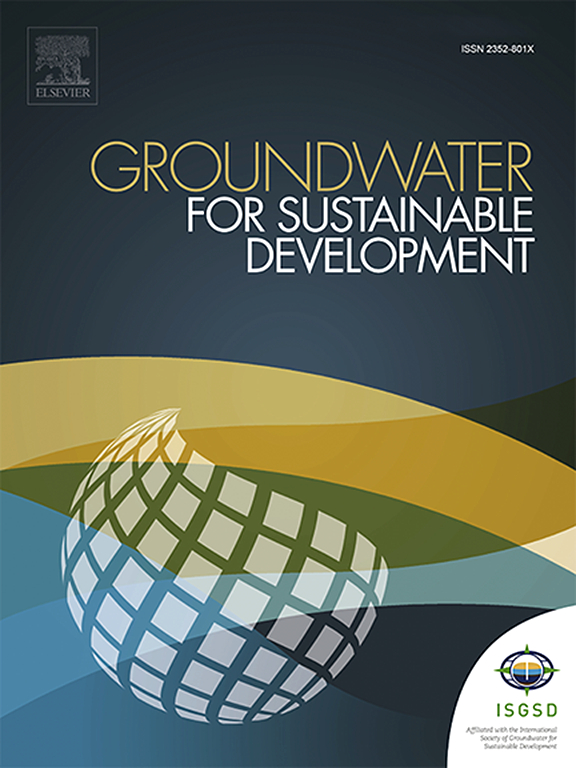通过蓄水层的储存和恢复实现低质量地下水的可持续恢复
IF 4.9
Q2 ENGINEERING, ENVIRONMENTAL
引用次数: 0
摘要
在快速城市化、气候变化和水资源污染的推动下,城市供水面临的挑战不断升级,需要创新的解决方案来实现可持续的水管理。城市地区经常遇到安装新生产井的空间限制,从而加剧了水资源短缺。气候条件的变化导致极端天气事件的发生次数增加,加剧了全球水资源短缺,阻碍了可持续发展,特别是影响到人类健康,加剧了社会不平等。为了解决这个问题,我们的研究探讨了在低质量含水层中改造不活跃生产井进行含水层储存和采收率(ASR),提供了一个系统框架。评价侧重于非活动井进行ASR作业的适宜性,并利用FEFLOW 8.1地下水模型评估水文地质条件对ASR系统采收率(RE)的影响。为了验证这一框架,我们将重点放在汉堡大都市区的西北地区,利用广义水文地质条件得出普遍适用的结果。该地区的特点是地下水中硫酸盐浓度高,限制了生产井的利用。我们的研究结果表明,低质量含水层的ASR可以构成解决水资源短缺的可行策略。在理想的含水层条件下,ASR的采收率可以达到100%以上。我们提出的框架强调了对井设计进行细致评估的必要性,考虑到建筑材料和地质因素,以防止堵塞。关键的效率因素包括水力梯度、注入和环境浓度、与生产井的距离以及分散性。此外,ASR通过加强水管理基础设施和优化能力利用,有助于降低成本。这项研究提供了一个全面的视角,为应对水资源短缺挑战的不同地区提供了有价值的见解。本文章由计算机程序翻译,如有差异,请以英文原文为准。

Sustainable restoration of low-quality groundwater through aquifer storage and recovery
The escalating challenges in urban water supply, driven by rapid urbanization, climate change, and water resources pollution, necessitate innovative solutions for sustainable water management. Urban areas frequently encounter spatial constraints for the installation of new production wells, thereby intensifying water scarcity. Shifting climate conditions lead to increased occurrences of extreme weather events, aggravating global water scarcity and impeding sustainable development, particularly impacting human health and exacerbating societal inequalities. To address this issue, our study explores the retrofitting of inactive production wells for aquifer storage and recovery (ASR) in low-quality aquifers, providing a systematic framework. The evaluation focuses on the suitability of inactive wells for ASR operations and utilizes the FEFLOW 8.1 groundwater model to assess the impact of hydrogeological conditions on ASR system recovery efficiency (RE). To validate this framework, we concentrate on the northwest region of the Hamburg metropolitan area, utilizing generalized hydrogeological conditions to yield universally applicable results. This region is characterized by high sulphate concentrations in groundwater, limiting the utility of production wells. Our findings demonstrate that ASR in a low-quality aquifer can constitute a viable strategy to address water scarcity. Under ideal aquifer conditions, ASR can achieve recovery efficiencies exceeding 100%. Our proposed framework emphasizes the necessity of a meticulous assessment of well design, considering construction materials and geological factors to prevent clogging. Key efficiency factors include the hydraulic gradient, injection and ambient concentrations, proximity to production wells, and dispersivity. Furthermore, ASR contributes to cost reduction by enhancing water management infrastructure and optimizing capacity utilization. This research provides a comprehensive perspective, offering valuable insights applicable to diverse locations grappling with water scarcity challenges.
求助全文
通过发布文献求助,成功后即可免费获取论文全文。
去求助
来源期刊

Groundwater for Sustainable Development
Social Sciences-Geography, Planning and Development
CiteScore
11.50
自引率
10.20%
发文量
152
期刊介绍:
Groundwater for Sustainable Development is directed to different stakeholders and professionals, including government and non-governmental organizations, international funding agencies, universities, public water institutions, public health and other public/private sector professionals, and other relevant institutions. It is aimed at professionals, academics and students in the fields of disciplines such as: groundwater and its connection to surface hydrology and environment, soil sciences, engineering, ecology, microbiology, atmospheric sciences, analytical chemistry, hydro-engineering, water technology, environmental ethics, economics, public health, policy, as well as social sciences, legal disciplines, or any other area connected with water issues. The objectives of this journal are to facilitate: • The improvement of effective and sustainable management of water resources across the globe. • The improvement of human access to groundwater resources in adequate quantity and good quality. • The meeting of the increasing demand for drinking and irrigation water needed for food security to contribute to a social and economically sound human development. • The creation of a global inter- and multidisciplinary platform and forum to improve our understanding of groundwater resources and to advocate their effective and sustainable management and protection against contamination. • Interdisciplinary information exchange and to stimulate scientific research in the fields of groundwater related sciences and social and health sciences required to achieve the United Nations Millennium Development Goals for sustainable development.
 求助内容:
求助内容: 应助结果提醒方式:
应助结果提醒方式:


